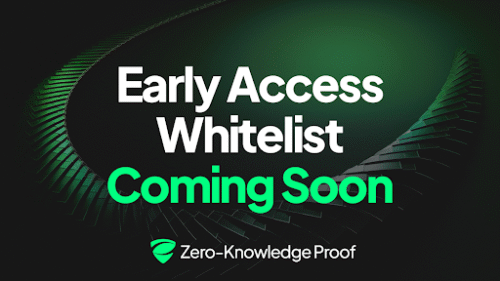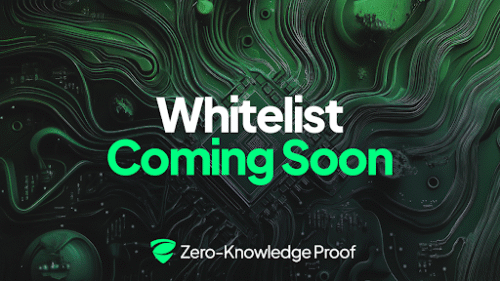SOL & BONK Spark Short-Term Gains, But BlockDAG’s $430M Presale & F1 Partnership Signal a Long-Term Market Shift
October 20, 2025E-Kuardun: Everything you need to know to buy with biggest bonus
October 20, 2025
Smart contracts have long been transparent by design—every detail visible to anyone on the network. That openness, while useful for trustless systems, makes it impossible to handle sensitive data or confidential business logic.
Zero Knowledge Proof (ZKP) introduces a new era through Shielded Smart Contracts, where logic and data are processed privately yet remain verifiable on-chain. This is not just a technical step forward—it’s a gateway to real-world adoption by businesses, institutions, and developers that require discretion without sacrificing trust. With its whitelist soon opening for presale access, Zero Knowledge Proof is laying the foundation for privacy-first decentralized applications.
Why Transparent Smart Contracts Fall Short
Traditional blockchains are like glass walls—every transaction, condition, and contract rule is fully visible. This transparency ensures accountability, but it also limits what can be built.

Key issues include:
- Data exposure: Confidential financial or identity details become public.
- Competitive risks: Business logic can be copied by rivals.
- Compliance conflicts: Sensitive data handling may violate privacy laws.
These limitations make public smart contracts unsuitable for sectors like healthcare, finance, and supply chain management. Enterprises need both trust and discretion, not one at the cost of the other. Zero Knowledge Proof addresses this by enabling encrypted logic that still runs verifiably on-chain. The balance it offers—between openness and confidentiality—is exactly what has been missing for blockchain to reach enterprise-grade utility.
The Breakthrough of Shielded Smart Contracts
Zero Knowledge Proof introduces Shielded Smart Contracts, a solution that allows private logic to execute within a verifiable framework. Using zero-knowledge cryptography, the system ensures that:
- Inputs, computations, and outputs are hidden from the public.
- Validators can confirm the correctness of a transaction without seeing the underlying data.
- Developers can deploy private logic without modifying the base protocol.
This approach creates the first environment where decentralized applications can operate confidentially without compromising security or decentralization. It opens doors for use cases such as private auctions, hidden bids, secure voting, and financial operations that require discretion. Shielded Smart Contracts are not about secrecy—they are about selective transparency: sharing proof of correctness without revealing the contents. This subtle but powerful change defines the next phase of blockchain maturity.
The Architecture Behind the Privacy Layer
At the heart of Zero Knowledge Proof lies an advanced cryptographic structure combining zk-SNARKs and zk-STARKs. Each serves a unique purpose:
- zk-SNARKs: Ideal for small, fast proofs in financial transactions.
- zk-STARKs: Perfect for scalable and transparent computations without trusted setups.
By integrating both, Zero Knowledge Proof allows developers to choose the right balance between efficiency and transparency. The network’s modular architecture ensures upgrades can happen without forks, and the account-based model streamlines zk-verifications for performance. On top of this, built-in SDKs allow developers to build private applications with minimal cryptographic knowledge. This thoughtful architecture means privacy is not a feature layered on afterward—it is part of the protocol’s DNA. Zero Knowledge Proof’s design ensures the system stays both scalable and adaptable as privacy standards evolve.
A Gateway to Real-World Adoption
Privacy becomes powerful only when it’s practical. Zero Knowledge Proof bridges that gap by creating an ecosystem where privacy and usability coexist naturally. Developers benefit from intuitive SDKs and grants that simplify building privacy-focused DApps. Enterprises gain access to Shielded Smart Contracts, enabling them to automate secure workflows in sectors like finance, healthcare, and logistics without risking data exposure. Users, in turn, enjoy seamless private transactions with full on-chain verification.

Beyond functionality, Zero Knowledge Proof integrates cross-chain interoperability, allowing private DApps to interact with established blockchains such as Ethereum and Solana. This interconnected approach ensures that privacy doesn’t mean isolation—it means empowerment. With the whitelist soon opening for presale access, early participants have a chance to explore the infrastructure designed for enterprise-grade confidentiality. Zero Knowledge Proof represents not just innovation but application readiness—a blockchain built for the real world.
Final Take
Zero Knowledge Proof marks the beginning of a new chapter in blockchain technology. By enabling Shielded Smart Contracts, it solves one of the industry’s biggest limitations—how to process private, verifiable logic without exposing sensitive data. For businesses, this means automation and transparency can now coexist. Developers gain a framework that’s flexible, secure, and built for compliance from day one.
As the whitelist prepares to open for presale access, the opportunity to engage with this privacy-focused ecosystem is closer than ever. Zero Knowledge Proof isn’t redefining transparency; it’s redefining trust—where confidentiality, accountability, and innovation meet. This is the true genesis of private smart contracts, setting the stage for secure, enterprise-ready blockchain adoption.
Disclaimer: This article is for informational purposes only and does not constitute financial or investment advice. Readers should conduct their own research before engaging with any blockchain project or presale event.
